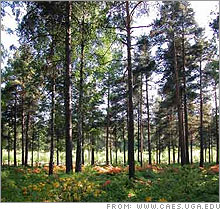In Georgia, fuel from the forestWith promises of a more economical and eco-friendly alternative to corn-based ethanol, the Peach State looks to become a player in the biofuel market.NEW YORK (CNNMoney.com) -- While it may not stop gas prices in their climb to $4 a gallon, long-term help could be on the way from Georgia's 24 million acres of majestic pine-filled forest lands. A consortium of government leaders, university researchers and entrepreneurs has the Peach State on the forefront of developing enzyme-based cellulosic ethanol using Georgia's abundance of longleaf pines and other varieties.  Advocates say this type of ethanol burns in a more environmentally friendly manner than corn-based ethanol and costs much less to produce. Experts say the amount of biomass needed to produce wood-based ethanol will come at up to an 80 percent discount to corn-based ethanol. How that will translate at the pump, where national prices hit a record $3.09 a gallon Tuesday, is unknown until commercial-level ethanol plants start coming on line in the next several years. Georgia officials, though, are excited at the state's potential through its vast natural reserves to become a major producer in the region. "To us here in Georgia and throughout the country, energy is something we have to be concerned about," said Ken Stewart, commissioner of the Georgia Department of Economic Development. "Utilizing the vast resources we have is very, very important to us." Leading the charge is privately owned Range Fuels Inc., which is at the vanguard of developing ways to use the ubiquitous Georgia pines as fuel in the alternative energy revolution. Backed by billionaire dot-com venture capitalist Vinod Khosla, Range Fuels is building a $225 million plant in Soperton, in southeastern Georgia. The plant will turn waste generated during tree harvesting into ethanol. Khosla has said he intends to build additional plants across South Georgia's pine-tree belt, with the goal of eventually producing more than a billion gallons of ethanol annually. Range Fuels CEO Mitch Mandich said in an interview that the company has no set timetable as to when the initial plant will open, but groundbreaking is likely before the end of the summer. "We're not going to talk about how long it takes us to put up a plant," Mandich said. "We have asserted we believe we will be the first commercial-scale cellulosic ethanol plant in the United States." Mandich said Range Fuels will be deriving the waste it uses in the ethanol-making process from local timber companies. The residual wood waste will be transported to the Range Fuels plant, where it will undergo a patented thermoconversion process to convert it to a synthetic gas, then to alcohol and ultimately to ethanol. The plant also can use paper pulp, peanut shells and even some municipal waste in the process. Surging corn prices are making conventional ethanol-making more and more expensive. Cellulosic ethanol production has taken on a higher profile recently, with researchers in Brazil saying Monday that they have come up with a revolutionary way to produce ethanol on an industrial scale from plant waste. Mandich, too, believes his company has a way that will provide a cleaner and cheaper alternative. "Even with our first implementation we'll be competitive with corn ethanol, and quickly over time we'll be far under corn ethanol," he said. Such news can't come too soon for the nation's $230 billion forest industry, which has struggled over the past several years to deal with foreign competition. The paper products industry has lost about 140,000 jobs over the past 10 years and nearly 100 mills have closed, according to the American Forest and Paper Association. But as Georgia becomes more of an ethanol player, local timber companies will have more markets in which to sell their products, at prices cheaper than foreign competitors because of savings passed on through lower transportation costs. Environmental advocates also love the idea. Wood-based ethanol is so eco-friendly that when the vital fuel ingredients are removed from a piece of virgin wood, that same timber can then be used for paper or pulp. The operation of wood ethanol plants, which can operate practically side by side with wood processing facilities, also requires far less fossil fuel use than corn ethanol operations. "That's what makes it incredible, when you consider that out of the same amount of wood you're getting probably the same quantity of pulp and paper, but in addition to that you're also generating a couple hundred gallons of ethanol," said Lori Perine, a forest association official. "From the big energy picture, you've got more bargain for your buck." Sam Shelton, a researcher at Georgia Tech's Strategic Energy Institute, said that to produce a gallon of ethanol it costs about $1.50 worth of corn but only about 30 cents of wood products. In addition, he said it takes about 10 times as much energy to produce one unit of corn ethanol as it does wood ethanol. "The economics look very good," Shelton said. "The energy balance also looks much better for wood than it does for corn." Shelton said the primary obstacle to getting wood ethanol plants on line now is engineering of the facilities, with the danger being in getting too ambitious with a process that is in a relative stage of infancy compared to other technologies. |
Sponsors
|

